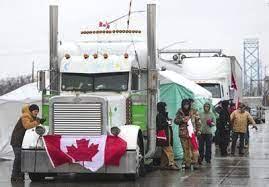 The so called "freedom convoy" that blocked the Coutts Alberta border crossing with the U.S. expanded during the second week of February to include major cities in central and eastern Canada. Most affected was the Ambassador Bridge linking Windsor, Ontario to Detroit, MI. responsible for transfer of approximately one quarter of trade between the U.S. and Canada. The trucker convoys and blockades have caused extensive disruption in major Canadian cities including the capital, Ottawa and the commercial center of Toronto.
The so called "freedom convoy" that blocked the Coutts Alberta border crossing with the U.S. expanded during the second week of February to include major cities in central and eastern Canada. Most affected was the Ambassador Bridge linking Windsor, Ontario to Detroit, MI. responsible for transfer of approximately one quarter of trade between the U.S. and Canada. The trucker convoys and blockades have caused extensive disruption in major Canadian cities including the capital, Ottawa and the commercial center of Toronto.
Truckers were protesting against mandated vaccination against COVID and federal requirements that unvaccinated truckers must quarantine on returning from the U.S. It is a matter of record that 90 percent of Canadian truckers are vaccinated against COVID, as is 80 percent of the population.
 Disruption and inconvenience caused by the truckers resulted in condemnation by politicians and trade groups and ultimately eroded any support by the general public for their action. It is estimated that plant closures deprived workers of up to $50 million in lost wages in the Province of Ontario. Truckers are still supported by some groups protesting against a range of requirements to suppress COVID and additional real or perceived concerns including disaffection with high prices for food and commodities. The two-week event supported by extremist elements in the U.S. disclosed an undercurrent of anarchy out of character with usually tolerant Canadians. Paradoxically, the truckers’ protests that disrupted supply chains will add to inflation, a complaint expressed by street demonstrators.
Disruption and inconvenience caused by the truckers resulted in condemnation by politicians and trade groups and ultimately eroded any support by the general public for their action. It is estimated that plant closures deprived workers of up to $50 million in lost wages in the Province of Ontario. Truckers are still supported by some groups protesting against a range of requirements to suppress COVID and additional real or perceived concerns including disaffection with high prices for food and commodities. The two-week event supported by extremist elements in the U.S. disclosed an undercurrent of anarchy out of character with usually tolerant Canadians. Paradoxically, the truckers’ protests that disrupted supply chains will add to inflation, a complaint expressed by street demonstrators.
City and provincial police and the RCMP initially worked to resolve issues by negotiation but subsequently issued citations and commenced towing vehicles to disperse blockades in accordance with injunctions granted by courts. Police action was taken in accordance with an Emergency Declaration by the Prime Minister, resulting of reopening of border crossings.